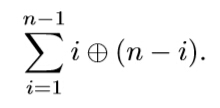Exclusive or
Time Limit: 2000/1000 MS (Java/Others) Memory Limit: 131072/131072 K (Java/Others)Total Submission(s): 327 Accepted Submission(s): 137
Problem Description
Given n, find the value of

Note: ⊕ denotes bitwise exclusive-or.

Note: ⊕ denotes bitwise exclusive-or.
Input
The input consists of several tests. For each tests:
A single integer n (2≤n<10500).
A single integer n (2≤n<10500).
Output
For each tests:
A single integer, the value of the sum.
A single integer, the value of the sum.
Sample Input
3 4
Sample Output
6 4
Author
Xiaoxu Guo (ftiasch)
Source
题解:
以下是官方给的答案:
鉴于比較难以理解官方大神的解说,这里我研究了一下,以下给出求解化简过程:
图片有些不清晰,凑合看吧 T^T
代码:
import java.util.*;
import java.io.*;
import java.math.*;
public class Main {
public static BigInteger zero=BigInteger.valueOf(0);
public static BigInteger one=BigInteger.valueOf(1);
public static BigInteger two=BigInteger.valueOf(2);
public static BigInteger four=BigInteger.valueOf(4);
public static BigInteger six=BigInteger.valueOf(6);
public static HashMap<BigInteger,BigInteger> map=new HashMap<BigInteger,BigInteger>();
public static BigInteger solve(BigInteger n)
{
if(map.containsKey(n))
return map.get(n);
BigInteger t=BigInteger.valueOf(0);
BigInteger k=n.divide(two);
BigInteger r=n.mod(two);
if(r.compareTo(one)==0)
t=solve(k).multiply(four).add(k.multiply(six));
else {
t=two.multiply(solve(k));
t=t.add(two.multiply(solve(k.subtract(one))));
t=t.add(four.multiply(k));
t=t.subtract(four);
}
map.put(n, t);
return t;
}
public static void main(String []args)
{
BigInteger n;
map.put(zero, zero);
map.put(one,zero);
Scanner cin = new Scanner(System.in);
while(cin.hasNext())
{
n=cin.nextBigInteger();
System.out.println(solve(n));
}
}
}
/*
借鉴别人的代码,学习了一下java大数和HashMap的使用方法,能够当作模版来使用了。
*转载请注明出处,谢谢。
*/

